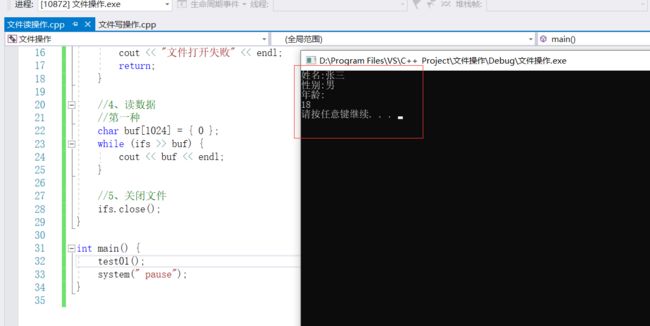- C++ 中的异常处理机制是怎样的?什么情况下应该使用异常处理?异常处理的优缺点是什么?
SUN_Gyq
javac++jvm
1)C++中的异常处理机制是怎样的?异常是一种处理错误的方式,当一个函数发现自己无法处理的错误时就可以抛出异常,让函数的直接或间接的调用者处理这个错误throw:当问题出现时,程序会抛出一个异常。这是通过使用throw关键字来完成的。catch:在您想要处理问题的地方,通过异常处理程序捕获异常,catch关键字用于捕获异常,可以有多个catch进行捕获。try:try块中的代码标识将被激活的特定异
- C/C++ 中有哪些类型转换方式? 分别有什么区别?类型转换可能会带来哪些问题?
SUN_Gyq
javajvm开发语言c++
1)C/C++中有哪些类型转换方式?分别有什么区别?在C/C++中,常见的类型转换方式有以下几种:隐式类型转换定义:也称为自动类型转换,是由编译器自动完成的类型转换,不需要程序员显式地进行操作。这种转换通常发生在不同数据类型的操作数进行混合运算时,编译器会自动将操作数转换为一种公共类型,然后再进行运算。inta=5;doubleb=3.14;doubleresult=a+b;//在这里,整数a会被
- 什么是结构体?什么是联合体?结构体和联合体有什么区别?能否在声明过程当中缺省名字?结构体可以包含函数吗?在 C 和 C++ 中有何不同?
SUN_Gyq
c语言c++开发语言
1)结构体结构体(structure)是一种由不同数据类型的成员组成的数据集合类型,它允许将多个相关的变量组合在一起,形成一个更复杂的数据类型。1.找成员当中最大的类型作为对齐2.按照定义的顺序实现空间分配3.实现地址分配要整数倍对齐4.当结构体当中成员为数组时需要将数组拆分成多个该类型的变量5.当结构体当中包含其他结构体类型的结构时先找到它的对齐数从而确定结构体的对齐数再进行分配位域(不存在地址
- C++设计模式——Iterator迭代器模式
程序员与背包客_CoderZ
C/C++设计模式c++设计模式迭代器模式开发语言c语言linux
一,迭代器模式的定义迭代器模式是一种行为型设计模式,它使得遍历一个容器对象中的元素变得更加简单。迭代器模式将遍历操作从容器对象(如集合、列表)中分离出来,它通过迭代器对象来遍历容器对象中的元素,使得遍历操作与容器对象解耦。迭代器模式可以解决的需求场景是当容器对象内部的结构经常被改变时,需要对外部屏蔽其变化过程。迭代器模式对外提供了一个统一的遍历接口,这个接口可以顺序访问容器对象中的每个元素。迭代器
- C++实现设计模式---中介者模式 (Mediator)
计算机小混子
设计模式c++设计模式中介者模式
中介者模式(Mediator)中介者模式是一种行为型设计模式,它用一个中介对象来封装一组对象之间的交互。中介者通过协调多个对象之间的通信,避免对象之间的直接依赖,从而实现对象之间的松耦合。意图通过引入一个中介者对象,减少对象之间的直接依赖,从而降低耦合性。中介者负责管理和协调对象之间的通信。使用场景对象之间的交互变得复杂:如果对象之间存在大量的直接引用和交互,可以使用中介者模式减少耦合。希望解耦多
- C++实现设计模式---迭代器模式 (Iterator)
计算机小混子
设计模式c++设计模式迭代器模式
迭代器模式(Iterator)迭代器模式是一种行为型设计模式,它提供了一种方法,顺序访问一个聚合对象中的各个元素,而又不需要暴露该对象的内部表示。意图提供一种方法,可以顺序访问一个容器对象中的元素,而无需暴露其内部实现。将遍历行为从集合对象中分离出来,使得遍历行为可以独立变化。使用场景需要顺序访问一个聚合对象中的元素:如数组、链表或集合。需要支持多种遍历方式:如正序遍历、反序遍历等。需要解耦遍历算
- c++如何输出质数
z5z3c
c++算法
以输出1到100之间的质数为例方法一//打印数组voidprint(vector&v){for(vector::iteratorit=v.begin();it!=v.end();it++){coutv;v.clear();for(inti=2;i&v){for(vector::iteratorit=v.begin();it!=v.end();it++){coutv;v.clear();//因为遍历
- Qt开发技术【C++ 实现类的二进制序列化与反序列化】
增援未来章北海
QTC++学习qtc++数据库
一、思考Qt本身的QByteArray和QDataStreamQDataStream和QByteArray是Qt框架中用于数据序列化和反序列化的类。QDataStream可以将Qt数据类型(如QString、QByteArray等)序列化为二进制格式,并写入文件或网络流中。同时,也可以从文件或网络流中读取二进制数据并反序列化成相应的数据类型。但是在嵌入式中使用代码比较冗余二、实现一个比较简单的仅对
- 整理一下一些Qt/C++第三方库
MayZork
qt开发语言c++
boost一个广泛的C++库集合,提供了大量的功能模块,包括但不限于数据结构、算法、并发编程、网络编程、文件系统、正则表达式、序列化等。poco也是一个广泛的C++库集合,提供了一套丰富的功能模块,包含网络通信、HTTP、文件系统、XML、JSON、数据库等。libevent轻量级的C语言库,主要用于异步网络编程。它提供了对I/O复用的支持,使得开发者可以在单线程中同时处理多个连接。QCustom
- C++ 游戏开发
周盛欢
c++开发语言
嘿,小伙伴们,想不想自己动手开发个游戏呀?今天就来带大家用C++开发游戏,保证通俗易懂,就算你是0基础也能跟上。一、为啥用C++开发游戏C++可厉害了,它运行速度快得跟闪电似的,能让你的游戏画面流畅得跟丝滑巧克力一样。而且它功能强大,啥复杂的游戏逻辑都能搞定,像那些大型的3D游戏,很多都是用C++开发的呢。二、开发环境搭建先得有个好用的开发工具,推荐用VisualStudio(VS)。去官网(ht
- 华为OD机试E卷 - 跳格子3 (Java & Python& JS & C++ & C )
算法大师
最新华为OD机试华为odjavapythonc语言javascriptc++华为OD机试E卷-跳格子3
最新华为OD机试真题目录:点击查看目录华为OD面试真题精选:点击立即查看题目描述小明和朋友们一起玩跳格子游戏,每个格子上有特定的分数score=[1,-1,-6,7,-17,7],从起点score[0]开始,每次最大的步长为k,请你返回小明跳到终点score[n-1]时,能得到的最大得分。输入描述第一行输入总的格子数量n第二行输入每个格子的分数score[i]第三行输入最大跳的步长k备注格子的总长
- 华为OD机试E卷 - 查找接口成功率最优时间段(Java & Python& JS & C++ & C )
算法大师
最新华为OD机试华为odjavapython华为OD机试E卷javascriptc++
最新华为OD机试真题目录:点击查看目录华为OD面试真题精选:点击立即查看题目描述服务之间交换的接口成功率作为服务调用关键质量特性,某个时间段内的接口失败率使用一个数组表示,数组中每个元素都是单位时间内失败率数值,数组中的数值为0~100的整数,给定一个数值(minAverageLost)表示某个时间段内平均失败率容忍值,即平均失败率小于等于minAverageLost,找出数组中最长时间段,如果未
- 华为OD机试CD卷- 跳格子3(Java & Python& JS & C++ & C )
算法大师
最新华为OD机试华为odc语言c++javajavascript
题目描述小明和朋友们一起玩跳格子游戏,每个格子上有特定的分数score=[1,-1,-6,7,-17,7],从起点score[0]开始,每次最大的步长为k,请你返回小明跳到终点score[n-1]时,能得到的最大得分。输入描述第一行输入总的格子数量n第二行输入每个格子的分数score[i]第三行输入最大跳的步长k输出描述输出最大得分备注格子的总长度n和步长k的区间在[1,100000]每个格子的分
- 第五讲:运算符与表达式:算术、关系、逻辑、赋值等运算符及其优先级
VNGRY
C++50讲算法c++
在C++编程中,运算符和表达式是构建程序逻辑的基础。它们允许我们对数据进行各种操作,从而得出新的数据值或执行特定的逻辑判断。C++中的运算符种类繁多,根据功能的不同,可以大致分为算术运算符、关系运算符、逻辑运算符和赋值运算符等几大类。此外,每种运算符都有其特定的优先级和结合性,这些规则决定了在复杂的表达式中,各个运算符的执行顺序。一、算术运算符算术运算符用于执行基本的数学运算,包括加法、减法、乘法
- 资深开发者需精通的10个C++高级主题
Incredibuild 官方账号
C++c++
C++正在快速向前发展,所以想要紧跟其脚步并不是一件容易的事。我们在之前的文章中讨论过这个问题,讨论了C++的演变以及如何实现遗留C++代码现代化。在这篇文章中,我们将重点介绍经验丰富的C++开发人员可以跟上的高级主题列表。该列表并不详尽,而且有点主观(我们可能已经放弃了一些您认为实际上非常重要的项目,或者一些您认为对您来说不那么重要的项目)。尽管我们的目标是列出高级C++主题,对一些人来说可能是
- 华为OD机试E卷 --跳格子3 --24年OD统一考试(Java & JS & Python & C & C++)
飞码创造者
最新华为OD机试题库2024华为odjavajavascriptpythonc语言
文章目录题目描述输入描述输出描述用例题目解析JS算法源码Java算法源码python算法源码c++算法源码题目描述小明和朋友们一起玩跳格子游戏,每个格子上有特定的分数score=[1,-1,-6,7,-17,7],从起点score[0]开始,每次最大的步长为k,请你返回小明跳到终点score[n-1]时,能得到的最大得分。输入描述第一行输入总的格子数量n第二行输入每个格子的分数score[i]第三
- C++ 的 CTAD 与推断指示(Deduction Guides)
王晓华-吹泡泡的小猫
现代C++c++现代C++类模板参数推导
1类模板参数推导(CTAD)1.1曲线救国CTAD的全称是类模板参数推导(ClassTemplateArgumentDeduction),它允许在实例化类模板时,根据构造函数的参数类型自动推导模板参数,从而避免显式指定模板参数。CTAD是在C++17引入的,在这之前,只有模板函数支持根据函数参数自动推导模板参数,类模板不支持这样的动作。代码中实例化类模板必须显式指定模板参数,十分不便,以致怨声载道
- 【3. 深入解析 C++ 数据类型:全方位指南】
涛ing
C++基础c++开发语言c语言linuxvisualstudiovscodevim
本章目录:前言1.什么是数据类型?2.C++基本数据类型类型修饰符3.数据类型的大小和范围4.高级数据类型:`typedef`和`enum``typedef`类型别名枚举类型(`enum`)5.类型转换1.静态转换(`static_cast`)2.动态转换(`dynamic_cast`)3.常量转换(`const_cast`)4.重新解释转换(`reinterpret_cast`)6.实用技巧:提
- qt/c++学习笔记之基于tcp的文件同步程序demo(第二部分)
Bryce学亮
qtc++学习
server服务器端头文件filebase.h#ifndefFILEBASE_H#defineFILEBASE_H#include#include#include#include#includeenumMsgType{MsgTypeInvaid=0,MsgTypeFile,MsgTypeDel,MsgTypeRename};classfilebase:publicQObject{Q_OBJECTp
- GESP认证C++编程真题解析 | 汇总
热爱编程的通信人
c++开发语言
学习C++从娃娃抓起!记录下CCF-GESP备考学习过程中的题目,记录每一个瞬间。2024年12月一级:二级:三级:四级:五级:2024年9月一级1.GESP认证C++编程真题解析|B4034小杨购物-CSDN博客2.GESP认证C++编程真题解析|B4035美丽数字-CSDN博客二级:1.GESP认证C++编程真题解析|B4036数位之和-CSDN博客2.GESP认证C++编程真题解析|B403
- 华为OD机试E卷 - 机器人活动区域(Java & Python& JS & C++ & C )
算法大师
最新华为OD机试java华为od机器人c语言javascriptpython华为OD机试E卷
最新华为OD机试真题目录:点击查看目录华为OD面试真题精选:点击立即查看题目描述现有一个机器人,可放置于M×N的网格中任意位置,每个网格包含一个非负整数编号,当相邻网格的数字编号差值的绝对值小于等于1时,机器人可以在网格间移动。问题:求机器人可活动的最大范围对应的网格点数目。说明:网格左上角坐标为(0,0),右下角坐标为(m−1,n−1),机器人只能在相邻网格间上下左右移动输入描述第1行输入为M和
- C/C++序列重构问题
*TQK*
算法练习c++重构c语言
问题描述采儿是一位负责一班名学生的老师。这些学生的学号是从1到,且各不相同。今天,所有学生以不同的时间进入教室。根据高桥的记录,当学号为的学生进入教室时(包括学号为的学生在内),教室里有名学生。(该同学进班时有几名同学,说明该同学第几个到的)根据这些记录,重构学生进入教室的顺序。约束条件•1≤≤105•1≤≤•≠(≠)•输入中的所有值均为整数。输入输入以以下格式从标准输入给出:12…输出按照学生进
- 华为OD机试E卷 --堆栈中的剩余数字--24年OD统一考试(Java & JS & Python & C & C++)
飞码创造者
最新华为OD机试题库2024java华为odjavascriptpythonjsc语言
文章目录题目描述输入描述输出描述用例题目解析JS算法源码Java算法源码python算法源码c算法源码题目描述向一个空栈中依次存入正整数,假设入栈元素n(1<=n<=2^31-1)按顺序依次为nx…n4、n3、n2、n1,每当元素入栈时,如果n1=n2+…+ny(y的范围[2,x],1<=x<=1000),则n1~ny全部元素出栈,重新入栈新元素m(m=2n1)。如:依次向栈存入6、1、2、3,当
- 华为OD机试E卷 --机器人活动区域--24年OD统一考试(Java & JS & Python & C & C++)
飞码创造者
最新华为OD机试题库2024华为od机器人javajavascriptpythonjs
文章目录题目描述输入描述输出描述用例题目解析JS算法源码Java算法源码python算法源码c算法源码c++算法源码题目描述现有一个机器人,可放置于M×N的网格Q中任意位置,每个网格包含一个非负整数编号。当相邻网格的数字编号差值的绝对值小于等于1时,机器人可在网格间移动问题:求机器人可活动的最大范围对应的网格点数目。说明:1)网格左上角坐标为(0,0),右下角坐标为(m-1,n-1)2)机器人只能
- VC++计算精解【6】
sakura_sea
VC++2022计算精解c++开发语言
文章目录二分法(BisectionMethod)数学原理c++参考文献二分法(BisectionMethod)数学原理如果一个函数f(x)f(x)f(x)在闭区间[a,b][a,b][a,b]上连续,且满足f(a)⋅f(b)#includeusingnamespacestd;//函数定义doublef(doublex){return3*pow(x,3)-7*pow(x,2)+11;}//二分法函数
- 「C/C++」C++关键字 之 mutable 可变变量关键字
何曾参静谧
c语言c++java
✨博客主页何曾参静谧的博客(✅关注、点赞、⭐收藏、转发)全部专栏(专栏会有变化,以最新发布为准)「Win」Windows程序设计「IDE」集成开发环境「定制」定制开发集合「C/C++」C/C++程序设计「DSA」数据结构与算法「UG/NX」NX二次开发「QT」QT5程序设计「File」数据文件格式「UG/NX」BlockUI集合「Py」Python程序设计「Math」探秘数学世界「PK」Paras
- 昇腾NPU推理YOLOV10目标检测(C++)
weixin_51923349
c++ffmpegopencv
1.准备工作基础环境:需要安装NPU固件驱动,CANN的包在昇腾官网下载,安装最新版就可以了。C++环境搭建链接:cplusplus/environment/catenation_environmental_guidance_CN.md·Ascend/samples-Gitee.com按照上面的链接,需要安装:presentagent,opencv,ffmpeg+acllite其中ffmpeg和o
- 1233 : C语言/C++单词倒置(ZZNUOJ)⭐⭐
*TQK*
ZZNUOJ题目合集c++数据结构c语言算法
题目描述(难度⭐⭐)最近birdfly收到了女友的几份信件,为了只要他俩知道信件的秘密,女友把信件里的每个单词都倒置了。这样只有birdfly将它们倒置过来才能明白女友的心思了。为此birdfly还特意请你编写程序帮他解决一下这个问题。简单起见假定每封信只包含英文单词和空格,每两个单词之间有一个空格。且长度不超过100,每个单词长度不超过50。输入输入有多组样例,每组样例输入一行英文(单词和空格)
- BOOST c++库学习 之 lockfree库入门实战指南 以及 使用lockfree库时对比普通队列、栈的测试例子
Narcotis
c++学习开发语言系统架构arm开发LinuxBoost
Boost.Lockfree库提供了一系列无锁数据结构,这些数据结构的主要优势在于高并发环境下的高效性和无锁操作的性能提升。无锁数据结构避免了传统的锁操作(如互斥锁)带来的性能瓶颈和复杂性,尤其在多核处理器系统中能够显著提高效率。核心组件1.无锁队列(boost::lockfree::queue)简介:boost::lockfree::queue是一个多生产者-多消费者(MPMC)的无锁队列,允许
- 华为OD机试D卷 --跳格子3--24年OD统一考试(Java & JS & Python & C & C++)
飞码创造者
最新华为OD机试题库2024华为odpythonc语言javascriptjavac++
文章目录题目描述输入描述输出描述用例题目解析java源码js源码python源码题目描述小明和朋友们一起玩跳格子游戏,每个格子上有特定的分数score=[1,-1,-6,7,-17,7],从起点score[0]开始,每次最大的步长为k,请你返回小明跳到终点score[n-1]时,能得到的最大得分。输入描述第一行输入总的格子数量n第二行输入每个格子的分数score[i第三行输入最大跳的步长k输出描述
- java类加载顺序
3213213333332132
java
package com.demo;
/**
* @Description 类加载顺序
* @author FuJianyong
* 2015-2-6上午11:21:37
*/
public class ClassLoaderSequence {
String s1 = "成员属性";
static String s2 = "
- Hibernate与mybitas的比较
BlueSkator
sqlHibernate框架ibatisorm
第一章 Hibernate与MyBatis
Hibernate 是当前最流行的O/R mapping框架,它出身于sf.net,现在已经成为Jboss的一部分。 Mybatis 是另外一种优秀的O/R mapping框架。目前属于apache的一个子项目。
MyBatis 参考资料官网:http:
- php多维数组排序以及实际工作中的应用
dcj3sjt126com
PHPusortuasort
自定义排序函数返回false或负数意味着第一个参数应该排在第二个参数的前面, 正数或true反之, 0相等usort不保存键名uasort 键名会保存下来uksort 排序是对键名进行的
<!doctype html>
<html lang="en">
<head>
<meta charset="utf-8&q
- DOM改变字体大小
周华华
前端
<!DOCTYPE html PUBLIC "-//W3C//DTD XHTML 1.0 Transitional//EN" "http://www.w3.org/TR/xhtml1/DTD/xhtml1-transitional.dtd">
<html xmlns="http://www.w3.org/1999/xhtml&q
- c3p0的配置
g21121
c3p0
c3p0是一个开源的JDBC连接池,它实现了数据源和JNDI绑定,支持JDBC3规范和JDBC2的标准扩展。c3p0的下载地址是:http://sourceforge.net/projects/c3p0/这里可以下载到c3p0最新版本。
以在spring中配置dataSource为例:
<!-- spring加载资源文件 -->
<bean name="prope
- Java获取工程路径的几种方法
510888780
java
第一种:
File f = new File(this.getClass().getResource("/").getPath());
System.out.println(f);
结果:
C:\Documents%20and%20Settings\Administrator\workspace\projectName\bin
获取当前类的所在工程路径;
如果不加“
- 在类Unix系统下实现SSH免密码登录服务器
Harry642
免密ssh
1.客户机
(1)执行ssh-keygen -t rsa -C "
[email protected]"生成公钥,xxx为自定义大email地址
(2)执行scp ~/.ssh/id_rsa.pub root@xxxxxxxxx:/tmp将公钥拷贝到服务器上,xxx为服务器地址
(3)执行cat
- Java新手入门的30个基本概念一
aijuans
javajava 入门新手
在我们学习Java的过程中,掌握其中的基本概念对我们的学习无论是J2SE,J2EE,J2ME都是很重要的,J2SE是Java的基础,所以有必要对其中的基本概念做以归纳,以便大家在以后的学习过程中更好的理解java的精髓,在此我总结了30条基本的概念。 Java概述: 目前Java主要应用于中间件的开发(middleware)---处理客户机于服务器之间的通信技术,早期的实践证明,Java不适合
- Memcached for windows 简单介绍
antlove
javaWebwindowscachememcached
1. 安装memcached server
a. 下载memcached-1.2.6-win32-bin.zip
b. 解压缩,dos 窗口切换到 memcached.exe所在目录,运行memcached.exe -d install
c.启动memcached Server,直接在dos窗口键入 net start "memcached Server&quo
- 数据库对象的视图和索引
百合不是茶
索引oeacle数据库视图
视图
视图是从一个表或视图导出的表,也可以是从多个表或视图导出的表。视图是一个虚表,数据库不对视图所对应的数据进行实际存储,只存储视图的定义,对视图的数据进行操作时,只能将字段定义为视图,不能将具体的数据定义为视图
为什么oracle需要视图;
&
- Mockito(一) --入门篇
bijian1013
持续集成mockito单元测试
Mockito是一个针对Java的mocking框架,它与EasyMock和jMock很相似,但是通过在执行后校验什么已经被调用,它消除了对期望 行为(expectations)的需要。其它的mocking库需要你在执行前记录期望行为(expectations),而这导致了丑陋的初始化代码。
&nb
- 精通Oracle10编程SQL(5)SQL函数
bijian1013
oracle数据库plsql
/*
* SQL函数
*/
--数字函数
--ABS(n):返回数字n的绝对值
declare
v_abs number(6,2);
begin
v_abs:=abs(&no);
dbms_output.put_line('绝对值:'||v_abs);
end;
--ACOS(n):返回数字n的反余弦值,输入值的范围是-1~1,输出值的单位为弧度
- 【Log4j一】Log4j总体介绍
bit1129
log4j
Log4j组件:Logger、Appender、Layout
Log4j核心包含三个组件:logger、appender和layout。这三个组件协作提供日志功能:
日志的输出目标
日志的输出格式
日志的输出级别(是否抑制日志的输出)
logger继承特性
A logger is said to be an ancestor of anothe
- Java IO笔记
白糖_
java
public static void main(String[] args) throws IOException {
//输入流
InputStream in = Test.class.getResourceAsStream("/test");
InputStreamReader isr = new InputStreamReader(in);
Bu
- Docker 监控
ronin47
docker监控
目前项目内部署了docker,于是涉及到关于监控的事情,参考一些经典实例以及一些自己的想法,总结一下思路。 1、关于监控的内容 监控宿主机本身
监控宿主机本身还是比较简单的,同其他服务器监控类似,对cpu、network、io、disk等做通用的检查,这里不再细说。
额外的,因为是docker的
- java-顺时针打印图形
bylijinnan
java
一个画图程序 要求打印出:
1.int i=5;
2.1 2 3 4 5
3.16 17 18 19 6
4.15 24 25 20 7
5.14 23 22 21 8
6.13 12 11 10 9
7.
8.int i=6
9.1 2 3 4 5 6
10.20 21 22 23 24 7
11.19
- 关于iReport汉化版强制使用英文的配置方法
Kai_Ge
iReport汉化英文版
对于那些具有强迫症的工程师来说,软件汉化固然好用,但是汉化不完整却极为头疼,本方法针对iReport汉化不完整的情况,强制使用英文版,方法如下:
在 iReport 安装路径下的 etc/ireport.conf 里增加红色部分启动参数,即可变为英文版。
# ${HOME} will be replaced by user home directory accordin
- [并行计算]论宇宙的可计算性
comsci
并行计算
现在我们知道,一个涡旋系统具有并行计算能力.按照自然运动理论,这个系统也同时具有存储能力,同时具备计算和存储能力的系统,在某种条件下一般都会产生意识......
那么,这种概念让我们推论出一个结论
&nb
- 用OpenGL实现无限循环的coverflow
dai_lm
androidcoverflow
网上找了很久,都是用Gallery实现的,效果不是很满意,结果发现这个用OpenGL实现的,稍微修改了一下源码,实现了无限循环功能
源码地址:
https://github.com/jackfengji/glcoverflow
public class CoverFlowOpenGL extends GLSurfaceView implements
GLSurfaceV
- JAVA数据计算的几个解决方案1
datamachine
javaHibernate计算
老大丢过来的软件跑了10天,摸到点门道,正好跟以前攒的私房有关联,整理存档。
-----------------------------华丽的分割线-------------------------------------
数据计算层是指介于数据存储和应用程序之间,负责计算数据存储层的数据,并将计算结果返回应用程序的层次。J
&nbs
- 简单的用户授权系统,利用给user表添加一个字段标识管理员的方式
dcj3sjt126com
yii
怎么创建一个简单的(非 RBAC)用户授权系统
通过查看论坛,我发现这是一个常见的问题,所以我决定写这篇文章。
本文只包括授权系统.假设你已经知道怎么创建身份验证系统(登录)。 数据库
首先在 user 表创建一个新的字段(integer 类型),字段名 'accessLevel',它定义了用户的访问权限 扩展 CWebUser 类
在配置文件(一般为 protecte
- 未选之路
dcj3sjt126com
诗
作者:罗伯特*费罗斯特
黄色的树林里分出两条路,
可惜我不能同时去涉足,
我在那路口久久伫立,
我向着一条路极目望去,
直到它消失在丛林深处.
但我却选了另外一条路,
它荒草萋萋,十分幽寂;
显得更诱人,更美丽,
虽然在这两条小路上,
都很少留下旅人的足迹.
那天清晨落叶满地,
两条路都未见脚印痕迹.
呵,留下一条路等改日再
- Java处理15位身份证变18位
蕃薯耀
18位身份证变15位15位身份证变18位身份证转换
15位身份证变18位,18位身份证变15位
>>>>>>>>>>>>>>>>>>>>>>>>>>>>>>>>>>>>>>>>
蕃薯耀 201
- SpringMVC4零配置--应用上下文配置【AppConfig】
hanqunfeng
springmvc4
从spring3.0开始,Spring将JavaConfig整合到核心模块,普通的POJO只需要标注@Configuration注解,就可以成为spring配置类,并通过在方法上标注@Bean注解的方式注入bean。
Xml配置和Java类配置对比如下:
applicationContext-AppConfig.xml
<!-- 激活自动代理功能 参看:
- Android中webview跟JAVASCRIPT中的交互
jackyrong
JavaScripthtmlandroid脚本
在android的应用程序中,可以直接调用webview中的javascript代码,而webview中的javascript代码,也可以去调用ANDROID应用程序(也就是JAVA部分的代码).下面举例说明之:
1 JAVASCRIPT脚本调用android程序
要在webview中,调用addJavascriptInterface(OBJ,int
- 8个最佳Web开发资源推荐
lampcy
编程Web程序员
Web开发对程序员来说是一项较为复杂的工作,程序员需要快速地满足用户需求。如今很多的在线资源可以给程序员提供帮助,比如指导手册、在线课程和一些参考资料,而且这些资源基本都是免费和适合初学者的。无论你是需要选择一门新的编程语言,或是了解最新的标准,还是需要从其他地方找到一些灵感,我们这里为你整理了一些很好的Web开发资源,帮助你更成功地进行Web开发。
这里列出10个最佳Web开发资源,它们都是受
- 架构师之面试------jdk的hashMap实现
nannan408
HashMap
1.前言。
如题。
2.详述。
(1)hashMap算法就是数组链表。数组存放的元素是键值对。jdk通过移位算法(其实也就是简单的加乘算法),如下代码来生成数组下标(生成后indexFor一下就成下标了)。
static int hash(int h)
{
h ^= (h >>> 20) ^ (h >>>
- html禁止清除input文本输入缓存
Rainbow702
html缓存input输入框change
多数浏览器默认会缓存input的值,只有使用ctl+F5强制刷新的才可以清除缓存记录。
如果不想让浏览器缓存input的值,有2种方法:
方法一: 在不想使用缓存的input中添加 autocomplete="off";
<input type="text" autocomplete="off" n
- POJO和JavaBean的区别和联系
tjmljw
POJOjava beans
POJO 和JavaBean是我们常见的两个关键字,一般容易混淆,POJO全称是Plain Ordinary Java Object / Pure Old Java Object,中文可以翻译成:普通Java类,具有一部分getter/setter方法的那种类就可以称作POJO,但是JavaBean则比 POJO复杂很多, Java Bean 是可复用的组件,对 Java Bean 并没有严格的规
- java中单例的五种写法
liuxiaoling
java单例
/**
* 单例模式的五种写法:
* 1、懒汉
* 2、恶汉
* 3、静态内部类
* 4、枚举
* 5、双重校验锁
*/
/**
* 五、 双重校验锁,在当前的内存模型中无效
*/
class LockSingleton
{
private volatile static LockSingleton singleton;
pri


